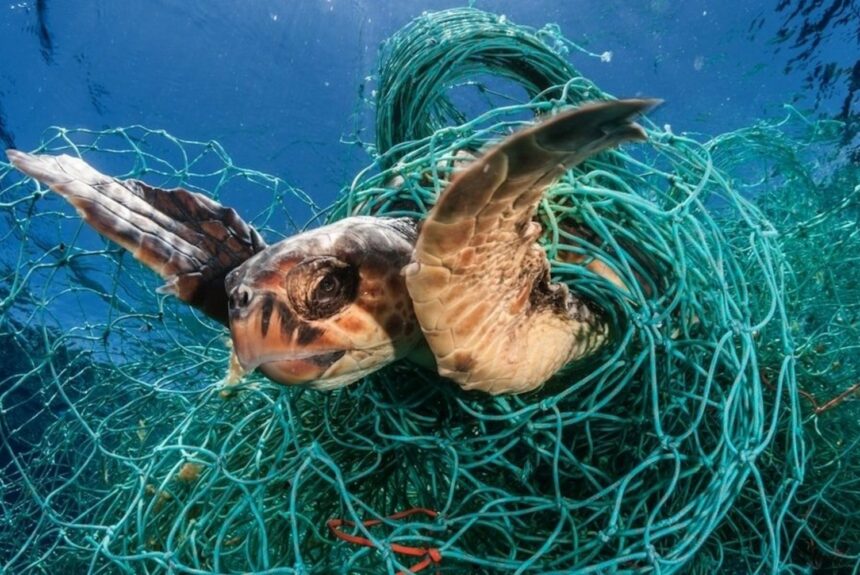Heavy winds are flowing in the sea while mighty tides are piercing the coastline of Alambarai village in Chengalpattu district of Tamil Nadu, a state in South India. Govind Gopalswami, 40 year-old fisherman is sailing his boat full of ghost nets, rather than fish or other marine animals. He will take out over 30kg (66lbs) of ghost nets at the coast where he will give them to social workers for scientific disposal.
>>>READ: How the Khasi Tribe is Trying to Save Endangered Gibbons in India
It is not an easy task to take or catch ghost nets or ghost gear floating in the sea. Sometimes ghost nets get entangled in the propellers of boats or boats themselves causing damage. Govind along with four or five other fellow fishermen sail in his small boat to catch ghost nets. Three people are required to take out heavy ghost gears to get into the boat. Sometimes ghost nets are too heavy for their boat to carry. “In such cases, we alert the Coast Guard with the GPS location of the ghost net. The Coast Guard then take[s] out [those] ghost nets,” says Govind. Fishermen say that following cyclones, the ocean is full of floating ghost nets.
Why Fishermen Decide to Retrieve Ghost Nets
A ghost net is a fishing net lost or abandoned in the ocean. Ghost nets are made up of plastic, fiber, and polythene. They cut or injure the limbs of marine species, sometimes leading to the death of fish, turtles, and sharks. According to the World Wildlife Foundation, as many as one million ghost nets and fishing equipment are abandoned in the ocean every year.
Fishermen from across 20 coastal villages in the two districts of Chennai and Chengalpattu in Tamil Nadu, India’s southern state, have observed over 120 species, including crabs, turtles, and dolphins that have been killed or injured due to ghost nets left in the ocean by fishermen. These villagers speculate that ghost nets are one of the reasons they have caught low yields of fish in recent years.
Looking to find a solution to the menace of ghost nets, fishermen approached Tree Foundation India, an NGO based in Chennai Tamil Nadu. The NGO was tasked with working with these fishermen on the conservation of sea turtles before focusing on ghost nets. “We then developed a model to create an awareness session on how ghost nets damage marine eco-system. We decided to ask fishermen to catch ghost nets as they know the sea so well. They know the sea, speed, and direction of wind and tides. Hence we did not opt to train other people who do not know the sea as volunteers. Now fishermen catch ghost nets and hand them over to us. We pay them Rs 5/kg [$.6/2 lbs] as compensation just to motivate them,” says Supraja Dharini, founder of the Tree Foundation India.
Over 3000 fishermen from 20 villages of two districts in Tamil Nadu have caught 90,000 kg (198,000 lbs) of ghost nets in the last two years. The Tree Foundation is in the process of partnering with other organizations and government departments on how to dispose of and recycle the ghost nets currently piled up at their office.
One officer from the Fisheries Department of Tamil Nadu reiterated that higher numbers of ghost nets in the sea along Tamil Nadu have decreased the number of fish caught and have either killed or injured many other marine animals. He lauded the efforts of the Tree Foundation in creating awareness among fishermen.
>>>READ: The Mangrove Foundation is Bringing Sustainability to India’s Maharashtra Villages
Supraja, the Tree Foundation’s founder, finds it difficult to convince fishermen and their families to join the project. “They are poor fishermen who earn hardly Rs 5000-6000 [$60-$72] per month through fishing. Nowadays fishing days have also reduced [due] to the decreasing number of fish in the sea, natural calamities like cyclone[s], and monsoons. Hence they hesitate to work for small compensation that we can offer them to catch ghost nets,” says Supraja while sharing the challenges the NGO faces.
T A Pugalasaran, another fisherman from Periya Neelankarai village in Chennai who is working with The Tree Foundation, says he joined the project after encountering a ghost net that damaged his fishing net. “It’s difficult to do this work. We need three to four people to catch the ghost net in the sea. We again need either three or four people or sometimes a[backhoe loader] to take out this ghost net at the coast. In this process, we lose income for that day. We generally catch fish for Rs 3000-4000 ($36-$48) per day. Catching a ghost net means no income. Meager income through compensation is not comparable to what we earn through fishing. But we want to keep the sea safe for the marine life that give[s] us livelihood,” he says.
During this process, Pugalasaran has experienced that damage to coral reefs along the coast has decreased. “We have also seen more fishes in the sea since we started catching ghost nets. My knowledge about to sustainable eco-system has gone up. Now I create awareness among other fishermen and their families to join the project,” he says.
Varsha Torgalkar is an India-based independent journalist. She covers public health, climate change, rural economy and travel. She has written for LA Times, SCMP, Asia Democracy Chronicles, Huffington Post and many Indian news websites. She has been a fellow of Earth Journalism Network, UNICEF and National Foundation of India. She has been a recipient of the PII-ICRC award for the best story.
The views and opinions expressed are those of the author’s and do not necessarily reflect the official policy or position of C3.
